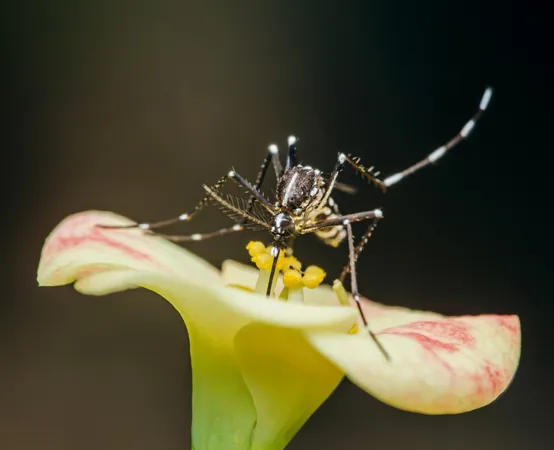
Breakthrough Discovery: Pain-Detecting Nerve Cells Unlock New Hope for Tackling Lung Scarring!
2025-09-16
Author: Jia
Revolutionary Research on Lung Disease Unveils New Mechanism
In a groundbreaking study from the University of Calgary, researchers have made an astonishing discovery about pulmonary fibrosis, a deadly lung disease commonly known as lung scarring. This research reveals that pain-detecting neurons play a crucial role in controlling harmful lung inflammation associated with this challenging condition.
The Silent Killer: Understanding Pulmonary Fibrosis
Pulmonary fibrosis is a relatively rare but devastating disease. Many patients diagnosed with it face grim odds, with most expected to succumb within five years. Traditionally, research has focused on why the lung lining deteriorates and how the body tries to heal it. However, until now, the involvement of nerve cells in this process had been overlooked.
The Pioneering Research Team and Their Findings
Led by Dr. Bryan Yipp from the Cumming School of Medicine, this research sheds light on specific nerve cells that not only sense pain but are also vital in regulating lung inflammation during fibrosis. Their findings, recently published in the journal *Immunity*, could pave the way for innovative neurological therapies to address lung-related diseases.
Dr. Yipp expressed optimism about their findings, stating, "Our exploration into the nervous system's influence on lung diseases is a novel approach. With neurological therapies already transforming treatments for conditions like seizures and mood disorders via nerve stimulation, it's intriguing to consider similar treatments may help mitigate lung scarring by enhancing the function of these protective nerves."
Nerve Cells: The Unsung Heroes of Lung Health
These nerve cells typically detect pain and irritants, triggering cough responses to protect the lungs. In experiments using mice, researchers found that these cells also regulate inflammatory responses. However, when these nerve cells were blocked—either through pharmacological means or genetic modification—the inflammatory reaction spiraled out of control, leading to increased lung damage.
Blocking the Villain: A Key to Recovery?
The study revealed that in the absence of these protective nerve cells, alveolar macrophages—immune cells responsible for lung protection—began producing an unusual neuropeptide called VIP, which is typically not produced by them. This neuropeptide exacerbated inflammatory lung injury. Dr. Carlos Hiroki, the study's lead author, highlighted, "When we inhibited VIP production or eliminated the gene responsible for it in dysfunctional macrophages, lung damage and inflammation significantly decreased. Conversely, reintroducing VIP caused further harm."
A Call to Action: Addressing a Critical Health Challenge
In Canada alone, around 2,500 lives are lost to lung scarring every year, while approximately 30,000 individuals suffer from this debilitating disease. The ongoing research at Dr. Yipp's lab aims to deepen our understanding of lung scarring, with the ultimate goal of developing effective new treatments. As we venture further into this promising field, the potential for revolutionary therapies that may one day transform the lives of those affected by pulmonary fibrosis is on the horizon.



 Brasil (PT)
Brasil (PT)
 Canada (EN)
Canada (EN)
 Chile (ES)
Chile (ES)
 Česko (CS)
Česko (CS)
 대한민국 (KO)
대한민국 (KO)
 España (ES)
España (ES)
 France (FR)
France (FR)
 Hong Kong (EN)
Hong Kong (EN)
 Italia (IT)
Italia (IT)
 日本 (JA)
日本 (JA)
 Magyarország (HU)
Magyarország (HU)
 Norge (NO)
Norge (NO)
 Polska (PL)
Polska (PL)
 Schweiz (DE)
Schweiz (DE)
 Singapore (EN)
Singapore (EN)
 Sverige (SV)
Sverige (SV)
 Suomi (FI)
Suomi (FI)
 Türkiye (TR)
Türkiye (TR)
 الإمارات العربية المتحدة (AR)
الإمارات العربية المتحدة (AR)